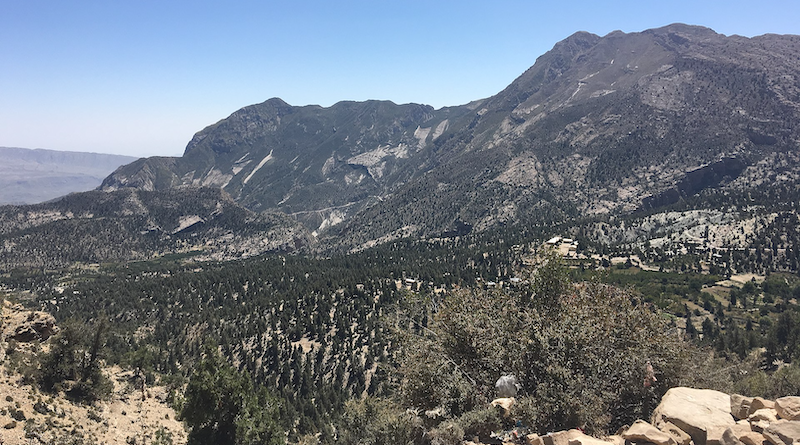Pakistan: Deforestation Of Juniper Trees In Zirat Valley – OpEd
Ziarat Valley is situated 133 km from Quetta, the capital city of Balochistan. Ziarat valley is surrounded by a lush green juniper forest, known locally as Sanober, home to the largest area of juniper forest in Pakistan, covering about 110,000 hectares. It is believed that the forest is the second largest of its kind in the world after California USA. It is said that some of the Juniper trees are up to 5,000 years old.
A large forest of Juniper trees, covers much of the valley, although it is threatened due to overuse by the local population and climate change. according to one estimate mature trees are often thousands of years old. Local people refer to the trees as „living fossils‟. The juniper forests grow in a semi-arid climate, and are slow-growing and long-lived.,
The Ziarat Juniper Forest was declared a World Biosphere Reserve in 2013 as a model region for researching and demonstrating successful approaches to protection and sustainable development. In accordance with UNESCO specifications, it is divided into a core area, buffer zone and transition area defined by how greatly they are affected by human activity. It also operates a biosphere management system.
According to the IUCN Red List subpopulations of juniperus excelsa polycarpus are under pressure and in many areas the juniper forests are actually declining.
Unesco has declared Ziarat’s juniper forest a “Biosphere Reserve”, Pakistan’s second, and the United Nations has added the forest to the World Network of Biosphere Reserves.
During the Earth Summit 2002 it was highlighted that old forests have global significance in terms of dealing with the threats from climate change. Due to its large area and old growth trees, the Ziarat Juniper Forest ecosystem as part of the global forest vegetation has assumed immense importance as carbon stock. It is predicted by the UN-REDD+ programme of Climate
Globally the juniper species are under pressure and in many areas the juniper forests are actually declining. This highlights the OUV of Ziarat Juniper Forest as a laboratory and focal area for preservation of the juniper ecosystem in line with the World Heritage Forest programme to further forest conservation on a global scale.
The Juniper forest in Ziarat Valley is spread over eight square kilometres, The juniper forests are declining day by day due to deforestation by the local population unabated by the district administration. Further juniper trees have suffered from temperature rises and ongoing drought since 1994. Decrease in Snowfall and irregular rainfall patterns have also caused damage to the trees . The use of banned sprays on nearby apple trees creates diseases amongst juniper trees. Pakistan is one of the few countries where banned agriculture sprays are used.
For centuries local people are cutting the trees on large scale for its usage as firewood and as timber in building the rooms.
Although few years ago, the provincial government have laid down the pipeline which provides gas to the main town of Ziarat but most villages do not have access to the gas facilities. Further during the winter, pressure in the pipes drops drastically, leaving the locals without gas for weeks at a time. Consequently axing of juniper trees continues in and around Ziarat. Villagers also cut the trees for shelter besides firewood in extreme cold weather, when temperature is sub-zero in the entire valley. these trees are cut for many purposes such as agriculture extension, construction, medicinal, and furniture purposes.
Strict actions must be taken by the authorities for the prevention of deforestation of junipers with immediate effect.The government should also provide the means of burning to the local populace such as gas and electricity regularly with out any load shedding for keeping their families warm. Besides energy provision, the creation of employment opportunities and developing specific forest prevention policies may help in preserving these forests for the better good of both the present and future generation. It is of utmost importance that these jewel species be saved and sustained for the betterment of the environment and the human himself.
The authorities, so far, have failed in preventing the people from cutting this precious forest. It has been reported that the local authorities are themselves involved in the trafficking of the trees for commercial and domestic consumption. In a nutshell, if the current pace of deforestation continues, we may not be able to preserve the eradication of this rare ancient treasure of forest. Both provincial and federal governments must think smart by providing all necessary financial resources and ensure regular flow of gas and electricity to the population of the area. Further international organisations such as UNESCO, IUCN and other stakeholders must come forward for technical and financial assistance in preservation of the juniper species in Zirat valley from its destruction.
Sher Khan Bazai, Former Secretary Education, Balochistan Pakistan. The writer can be reached at [email protected]


Great work….These are living Fossils…